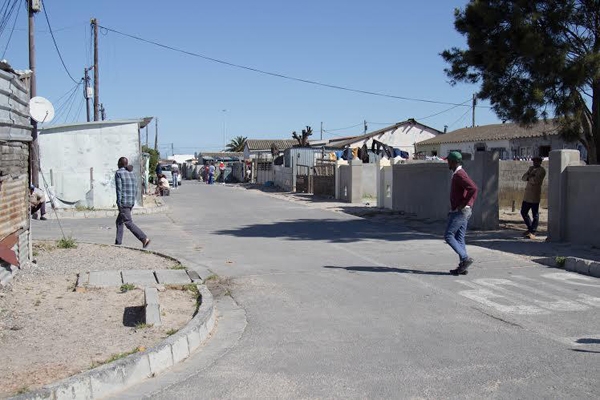

Zwelitsha Drive in Nyanga. Photo by Joyce Xi.
6 October 2014
“Every day I wake to hear that someone has been shot dead or is in a critical condition in hospital”, says Lilitha Ncwangu, 12.
“In Nyanga people die almost every day”.
Police crime statistics by precinct released last month put Nyanga at the top of the list for murders, with 305 murders in 2014 compared to 262 in 2013.
There were 175 attempted murders (210 in 2013). Robberies at residential premises were up to 148 from 108 in 2013.
Lilitha, who is currently in grade 6, says she would like to leave Nyanga because she doesn’t see any future for her there.
“A few weeks ago I saw a young boy I know being beaten to death by other boys.
“They saw this boy walking and chased after him. In a few minutes they caught him and threw stones at him and hit him with pangas. There were about eight boys beating this one person. He was rescued by a taxi driver passing by.”
The other boys ran away, leaving their victim unconscious. Lilitha says he died in hospital.
“ Near my house there are shebeens, gangsters, rapists, ex-convicts, murderers and they become part of our society. We as little girls we have to be careful. Even when we are at home it’s not safe, because anything could happen”, says Lilitha.
She told GroundUp about a girl who was raped by a neighbour inside the child’s home and in front of her grandmother. The rapist is walking the streets, she says.
Sometimes in winter when it is dark in the morning she and her younger sisters skip school. They are afraid of becoming the victim of crime or of seeing a dead person on the street in the dark, she says.
She believes Nyanga is cursed and that the authorities have given up on the area.
“When I grow up I want to be a successful woman and take my family out of this area. If I had means I would go stay in a boarding school because my chances of success here in Nyanga are limited”.
“Other than murders and other crimes there is also poverty and teenage pregnancy and a high epidemic of HIV/AIDS. And also there are no role models. Those who are successful leave the area and don’t want to look back, ”she says.
But if young people could be offered opportunities and education, there would still be hope for Nyanga, says Lilitha.
Mzukhanyo Yeko, 20, is in grade 11, and also wants to leave Nyanga.
“Everyday when I have to go to school I have to pray to God and ask him for protection because when I leave my house anything could happen to me”.
He says it is hard to have hope when you wake up in the morning and hear about deaths, rapes, robberies and the failures of others.
He himself has been attacked by gangsters twice, the first time when crossing Eisleben Road into Zwelitsha Road on his way home from school.
“As I was crossing four boys approached me and I thought they were about to mug me so I ran. They ran after me and caught me and beat me up. One of them was about to stab me but when he turned me around to look at my face he said ‘no man it’s not him it’s the wrong person’.
“They took my phone and my school bag and ran”, says Yeko.
He says people were watching and they didn’t do anything, he thinks because they assumed he was part of a gang. But after few minutes someone came to help him.
“In my street when people get mugged they don’t do anything because it has become a norm. Instead some people laugh, asking why were you walking on that road because you know its dangerous. They make as if it’s the victims’ fault if they were mugged or even killed”.
The second time he was attacked was in June this year at about 8 in the evening when he was coming home from a shop. “Gangs chased me and I had to hide inside a sewage drain for more than an hour. It was dark and smelly. I had no choice”, says Yeko.
He has not been back to school because he is scared of being mistaken for a gang member. He also believes that he is not safe where he lives.
During the day there are always shootings in the area and people do not report them, he says.
“At night you count the number of bullets shot and wonder who is being murdered and when you wake up in the morning, people would be talking about the shooting and most times it’s a person you know who is murdered.
“There are young children who pass dead bodies as they go to school in the morning and some of them don’t get shocked because almost every day they hear about deaths.”
Yeko dreams of being a DJ and a sportsman. He has worked as a DJ but doesn’t do it any more because he says it’s not safe to take his equipment to places where he might get mugged after the event. Instead, he plays his music at home.